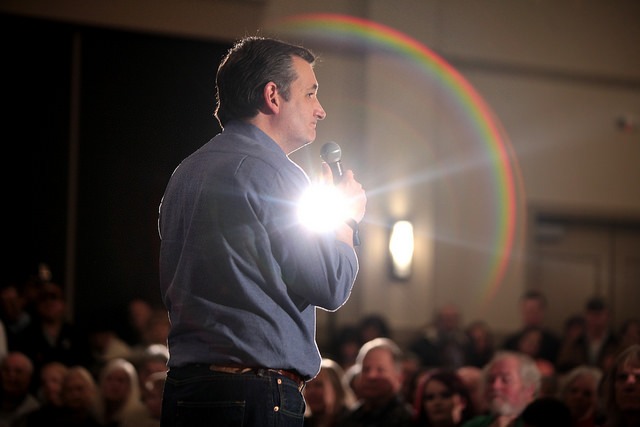Cruz takes home Iowa Caucus victory, Sanders gives Clinton run for her money
3 min read
Gage Skidmore | Flickr.
By EMILY HOLLINGSWORTH
Some might have not expected Texas senator Ted Cruz to nab the majority of Iowa voters or for former secretary of state Hillary Clinton and Vermont senator Bernie Sanders to come neck and neck with a near half-split of votes.
But that was the outcome of the Iowa Caucus, which began Monday, Feb. 1 at 7 p.m. CT and 8 p.m. EST.
With 100 percent of the votes reporting, Cruz won the Iowa Caucus for the Republican Party this year with 27.6 percent of the overall vote and had gotten votes from eight delegates. Candidate Donald Trump was not far behind, coming second at 24.3 percent and had received votes from seven delegates. The third runner-up, Marco Rubio, came at 23.1 percent and had also gotten the vote from seven delegates.
For the Democratic Party, Clinton edged the win by .3 percent, having 49.9 percent of the vote with 23 delegates and Sanders 49.6 percent with 21 delegates.
More than 180,000 Republicans were present during the caucus and more than 170,000 Democrats turned their vote for the caucus, a record turnout for voters in Iowa, according to a report by The Huffington Post. Though a large amount of voters for the state of Iowa, the votes in Iowa are a small number compared to other states, according to Stephen Farnsworth, professor of political science and international affairs and director of the Center for Leadership and Media Studies.
Additionally, according to Farnsworth, the Iowa caucus is a small part of the overall assortment of viewpoints in the United States, and an underrepresented state generally. For those who were frustrated or disappointed that their candidate did not get a higher vote, there’s still time. The next state to cast its vote for the candidates, the New Hampshire primary, will take place Tuesday, Feb. 9.
However, Farnsworth also said that the New Hampshire primaries tend to make or break campaigns.
“New Hampshire is traditionally the state where a lot of campaigns make their last stand,” Farnsworth said.
Farnsworth cited candidate Jeb Bush, who had ranked low among Iowa voters with only 2.8 percent. According to Farnsworth, candidates still have time to strengthen their campaign among voters before the primary. Afterward, often, low-ranking candidates will drop out of the race.
“If you don’t do well in Iowa and New Hampshire, that’s usually about it for your campaign,” Farnsworth said.
Freshman Lisa McKinley gave her take on one candidate, Democrat and Maryland governor Martin O’Malley, who bowed out the presidential race along with Republican and former governor of Arkansas Mike Huckabee after failing to register for the Iowa caucus.
“I’m really upset that O’Malley dropped out because I feel like he [has] been a great candidate,” McKinley said. “I think if the media wasn’t so heavily involved he would have had a much better chance.”
Virginia’s primary will take place March 1. According to Farnsworth, the state of Virginia is not as easy to predict results as voters are not registered by parties compared with other states. Instead, voters in Virginia request a ballot for the Democratic or Republican Party when they arrive at the polls.
Time will tell on how the rest of the country will vote, according to Farnsworth. “We’ve only heard from one state, and a very unrepresented one at that,” Farnsworth said. “We still have 49 to go. A lot can happen between now and the conventions.”
Izzy Briones contributed to this report.


